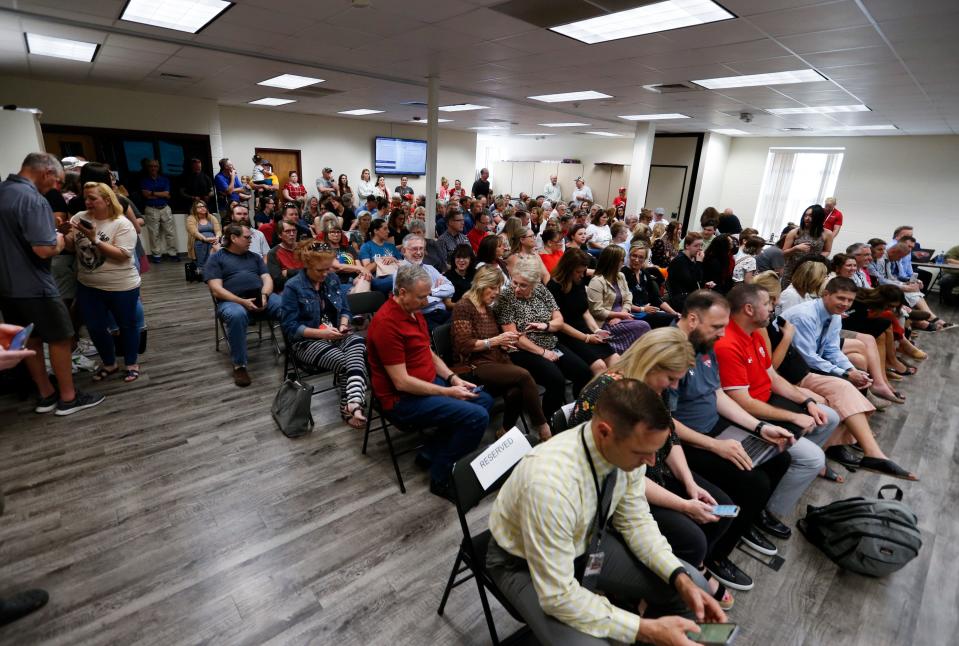Five of 2022's most challenged books in U.S. were restricted in Nixa after parent requests
The American Library Association's Office for Intellectual Freedom released its list Monday of the most challenged books in 2022.

Among the Top 10 most challenged books — which resulted in 13 different titles because of ties — were several that residents in either Nixa or Springfield sought to remove from school shelves in recent years.
The Springfield challenge was unsuccessful but five of the books on the national most-targeted list were restricted, by the school board or district review committees in Nixa.
The ALA documented 1,269 demands to censor library books and resources in 2022 and nearly double the 729 book challenges reported in 2021 — a 38% increase.
The number of attempted book bans in 2022 — involving 2,571 different titles — is the highest in a single year since the ALA began compiling data about censorship more than 20 years ago.
In 2003, there were 305 challenges. In 2012, there were 339.
Many of the challenged books deal with issues of sexual orientation, gender identity, racial trauma, drug use, and sexual or other types of abuse.
More: Behind closed doors, Springfield school board rejected two book ban attempts in 2021
Here is the Top 10 list of most challenged books in 2022, according to the ALA:.
"Gender Queer: A Memoir" by Maia Kobabe, challenged 151 times for LGBTQ+ content, claimed to be sexually explicit;
"All Boys Aren't Blue" by George M. Johnson, challenged 86 times for LGBTQ+ content, claimed to be sexually explicit;
"The Bluest Eye" by Toni Morrison, challenged 73 times for depiction of sexual abuse, claimed to be sexually explicit, plus diversity, equity and inclusion content;
"Flamer" by Mike Curato, challenged 62 times for LGBTQ+ content, claimed to be sexually explicit;
"Looking for Alaska" by John Green, challenged 55 times for LGBTQ+ content, claimed to be sexually explicit;
"The Perks of Being a Wallflower" by Stephen Chbosky, challenged 55 times for LGBTQ+ content, claimed to be sexually explicit, depiction of sexual abuse, drug use, profanity;
"Lawn Boy" by Jonathan Evison, challenged 54 times for LGBTQ+ content, claimed to be sexually explicit;
"The Absolutely True Diary of a Part-Time Indian" by Sherman Alexie, challenged 52 times for profanity, claimed to be sexually explicit;
"Out of Darkness" by Ashley Hope Perez, challenged 50 times for depictions of abuse, claimed to sexually explicit;
"A Court of Mist and Fury" by Sarah J. Maas, challenged 48 times, claimed to be sexually explicit;
"Crank" by Ellen Hopkins, challenged 48 times for drug use, claimed to be sexually explicit;
"Me and Earl and the Dying Girl" by Jesse Andrews, challenged 48 times for profanity, claimed to be sexually explicit;
"This Book Is Gay" by Juno Dawson, challenged 48 times for providing sexual education, LGBTQ+ content, claimed to be sexually explicit.
More: Nixa High School restricts access to 10 books including Toni Morrison's 'The Bluest Eye'
"Perks of Being a Wallflower" was challenged in both Springfield and Nixa. The Nixa school board restricted it but the Springfield board did not.
The Nixa board removed "All Boys Aren't Blue" and review committees restricted access to "Looking for Alaska," "Out of Darkness," and "Bluest Eye."
Other books, not on the Top 10 list, were also restricted or removed in Nixa and Willard.
Parents, patrons initiate most book challenges
In the annual ALA report State of America's Libraries 2023, Tracie D. Hall, executive director of the ALA, noted all the challenges faced in the past year.
"Many libraries and their staffs nationwide — school, public, college and university, special, carceral, and consortial — found themselves contending with reduced funding and staffing, threats to personal safety in the form of bomb scares and to professional livelihoods from firings and job losses, and bills threatening to criminally charge librarians or defund libraries altogether for making certain materials available on their shelves or findable through reference services," Hall wrote.
"Despite these pressures, libraries have proven themselves to be among the most adaptable of public and community-serving institutions. Just as they have faced numerous challenges, they have also found themselves needed in new and profound ways by their constituencies and, in responding to these rising demands, have found a way to innovate hybrid-service delivery models and programs that increasingly seek to get to the root causes of information, education, and socio-economic inequities and create opportunities in those same spaces."
In Missouri, a new law made it a crime for school officials to provide books with "explicit sexual material" to students. It has prompted districts across the state to review or remove hundreds of books this school year.
More: Nearly 300 books targeted, banned in MO schools since new state law took effect in August
A lawsuit filed by the Missouri ACLU in Kansas City in February is challenging the law saying it is a violation of First Amendment rights and is overly broad in scope and definition.
The national ALA report provided insight into where challenges originated, and what was targeted, in 2022.
For example, in cases where the book challenge initiator is known, here is the breakdown: 30% from parents, 28% from patrons, 17% from political or religious groups, and 16% from school boards or administrators.
There are a smattering of challenges from elected officials.
Of the 1,269 challenges in 2022, 82% involved books, graphic novels and textbooks. Other challenges targeted displays, exhibits, programs and access to materials.
Nearly all the challenges involved younger readers' access to books: 48% were in public libraries, 41% were in school libraries, 10% were in schools and just 1% were higher education libraries and other institutions.
Claudette Riley covers education for the News-Leader. Email tips and story ideas to criley@news-leader.com.
This article originally appeared on Springfield News-Leader: Five of 2022's most challenged books were targeted by Nixa parents

